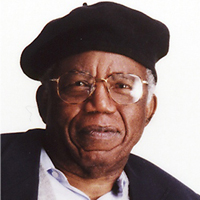Civil Peace by Chinua Achebe: Summary
The well-known Nigerian author Chinua Achebe's short story 'Civil Peace' is a realistic story which presents the condition immediately after the Civil War. The story is about a Biafran civil war and its effect on the lives of ordinary Nigerian people.

Chinua Achebe
It is an interesting and touching comment on quick and easy recovery from hardship after the war. Most people are damaged by the aftereffects of the war, but Jonathan Iwegbu thinks himself very lucky to have survived, although he had lost his youngest son. He had come out of the war with five inestimable blessings to him, his wife Maria and his three out of four children. As an extra bonus he had his bicycle, which he dug up almost as good as new after the fighting had stopped. This bicycle was almost seized by the military officer, but he got it by spending two pounds. Then he found his little house in Enugu still standing, despite the absence of minor details like doors, windows and a roof. For someone like Jonathan Iwegbu who saw everything in positive terms, this was another miracle in the town. And now the family started its journey back to normality and prosperity. The children started selling mangoes, his wife sold akara balls and he was involved in his selling palm-wine. From one point of view, it is meager material with which to start a new life, but to the very optimistic Jonathan it is, after the horrors of war, blessing upon blessing. The final windfall is the ex-gratia payment (the egg rasher) he receives. It confirms his belief in a generous god. 'Nothing puzzles God' is his catchphrase. In both situations he uses the same phrase. Everything that life provides is a bonus to him. He counts himself extraordinarily happy after he has survived the war. The recovery of his bicycle is another miracle for him because he sees everything in positive terms. He starts a new life in his house with insufficient material. He is optimistic and is happy with what he has. The ex-gratia payment is the windfall gain. But when the thieves take it away, he is engaged in his everyday work. He considers that his life did not depend on that money last week. He is clever and practical. Once his bicycle was seized by military officials, but Jonathan got it back by giving the man two pounds. He willingly gave twenty pounds and saved the lives of his family members. He works hard in both situations. He has complete faith in God.
One night there occurs a further return to normality when thieves pay the long-suffering to Jonathan. First of all, the thieves knock on the door and politely announce themselves 'No tief man and his people'. When the family screams for help the thieves offer their assistance, knowing no one will come to help and that the soldiers are more to be feared than themselves. Once that has been settled, they are prepared to be reasonable. They say that they are not bad thieves to trouble the people, that war as well as trouble has finished, and that it is the time of civil peace. After the uneasy negotiation, Jonathan comes to accept the new conditions of civil peace and hands over his egg rasher. Although the great mass protests, the leader, as a 'good ties' promise a fair business: 'we just take our small money and go. When his neighbors appear in the early morning to express their sympathy, the family is at work again. And Jonathan has 'written off his egg rasher: Did I depend on it last week? Or is it greater than other things that went to the war? ... Nothing puzzles God! Once again, his optimistic fatalism enables him to rise above the difficulty. Everything that life provides is a bonus. In this fine story Achebe carefully maintains the balance between realistic reportage and the firm shape of the fable so that the result tells us more about the war and its after effects than any account of detailed documentation.
Reading on Civil Peace
Critical Commentray of Civil Peace
Story of Civil Peace by Chinua Achebe
 |
bachelorandmaster.com |